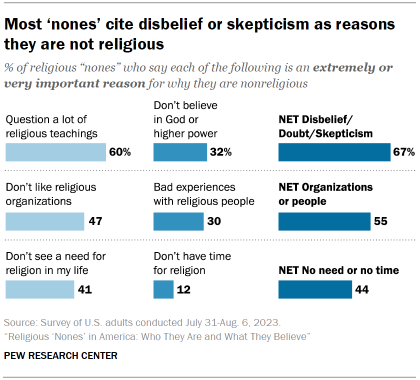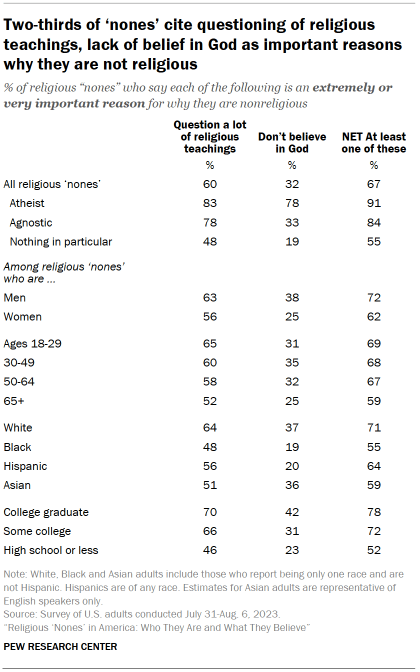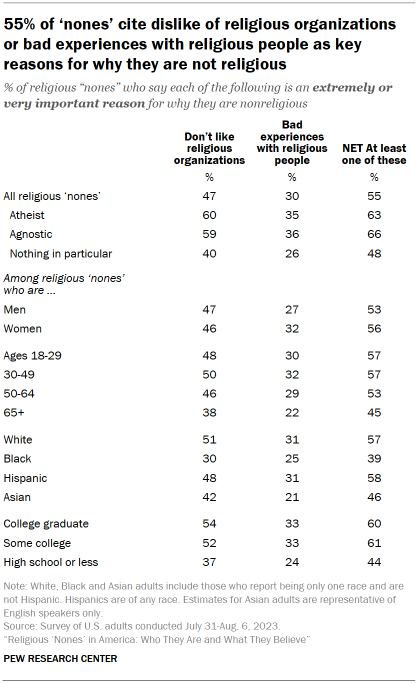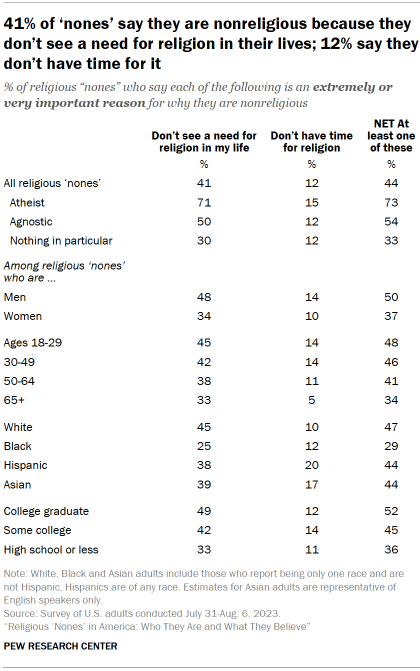The survey asked “nones” why they are nonreligious, offering a list of six possible reasons and asking respondents to say whether each is an extremely, very, somewhat, not too, or not at all important reason why they are nonreligious. Respondents could choose multiple reasons, and many did.

The reason “nones” give most often for not having a religion is that they question religious teachings: 60% say doubt about these teachings is an extremely or very important reason why they are nonreligious. In addition, 32% cite a lack of belief in God or any other higher power. Altogether, 67% cite skepticism or nonbelief (or some combination of both) as a key factor in why they are nonreligious.
Meanwhile, 47% of “nones” say their dislike of religious organizations is an extremely or very important reason they are nonreligious. And 30% cite bad experiences with religious people. Altogether, 55% of “nones” mention religious organizations or religious people (or both) as key reasons for being nonreligious.
About four-in-ten “nones” attribute their lack of religiousness to not having a need for religion in their lives. And 12% say they don’t have time for religion. Altogether, 44% cite a lack of need or a lack of time (or both) as reasons for why they are not religious.
Doubts about religious teachings and lack of belief in God

Overall, two-thirds of “nones” say skepticism about religious teachings or lack of belief in God are key reasons for why they are nonreligious.
Fully 91% of atheists cite these matters of doubt or disbelief as factors for why they are nonreligious, as do 84% of agnostics. These reasons are cited by lower shares of “nones” (55%) who say their religion is “nothing in particular.”
Differences by gender, age, and race and ethnicity
Men who are “nones” are more likely than women to cite skepticism about religious teachings and lack of belief in God as important reasons for why they are nonreligious.
The oldest “nones” (those ages 65 and older) are somewhat less likely than younger “nones” to cite skepticism of religious teachings and a lack of belief in God as reasons for why they are nonreligious.
Higher shares of White and Asian “nones” cite a lack of belief in God as a reason for their nonreligion than do Black and Hispanic “nones.” Roughly two-thirds of White “nones” cite skepticism of religious teachings as a key reason for why they are nonreligious.
Dislike of religious organizations and bad experiences with religious people

Overall, 55% of “nones” cite a dislike of religious organizations or bad experiences with religious people as important factors for why they are nonreligious.
Differences by education, age and gender
“Nones” under 65 are more likely than older “nones” to cite dislike of religious organizations or bad experiences with religious people as key reasons for why they are nonreligious.
And more “nones” with college experience cite these as key reasons for their lack of religiousness than do “nones” who have not attended college.
Roughly one-third of “nones” who are women (32%) say having had bad experiences with religious people is an important reason for why they are nonreligious, compared with 27% of “nones” who are men.
Lack of need for religion, no time for it

Overall, 44% of “nones” (including 73% of atheists) say they are nonreligious because they don’t see a need for religion in their lives or they don’t have time for religion.
Differences by gender, age and race and ethnicity
Among “nones,” men are more likely than women to say that not needing religion is a key reason for their lack of religiousness. And the youngest “nones” (ages 18 to 29) are more likely to say this than the oldest “nones” (65 and older).
White, Asian and Hispanic “nones” are each more inclined than Black “nones” to say not having a need for religion in their lives is a key reason for their nonreligion.
Return to the report’s Overview.
Find answers to other questions:
- Who are the ‘nones’? How are they defined? (Chapter 1)
- Are ‘nones’ less involved in civic life than people who identify with a religion? (Chapter 3)
- Are all ‘nones’ nonbelievers? (Chapter 4)
- Are ‘nones’ spiritual instead of religious? (Chapter 5)
- Are ‘nones’ hostile toward religion? (Chapter 6)
- How do ‘nones’ view science? (Chapter 7)
- How do ‘nones’ think about morality? (Chapter 8)




